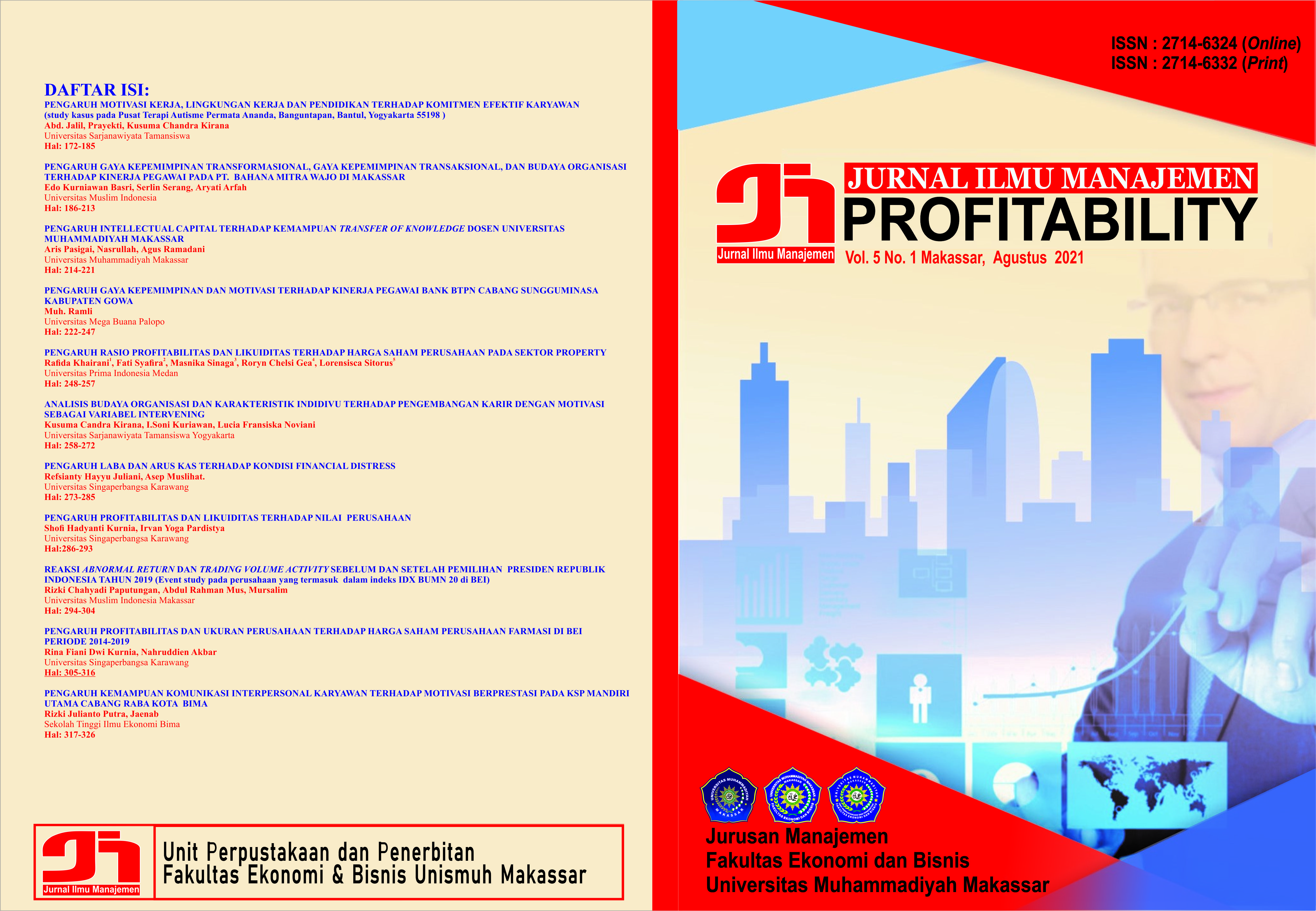ANALYSIS OF ORGANIZATIONAL CULTURE AND CHARACTERISTICS OF INDIVIDUAL CAREER DEVELOPMENT MOTIVATION AS AN INTERVENING VARIABLE
DOI:
https://doi.org/10.26618/profitability.v5i2.5904Kata Kunci:
Organizational Culture, Individual Characteristics, Commitment, Career Development, MotivationAbstrak
The purpose of this study was to determine the effect of organizational culture and individual characteristics on career development with motivation as an intervening variable. The object of this research is the Yogyakarta City Health Office. This study used a descriptive study using a quantitative approach with a total sample size of 35 respondents. The results of this study indicate that: Organizational culture has a positive and significant effect on motivation, Individual characteristics have a positive and significant effect on motivation, motivation has a positive and significant effect on Career Development, Organizational Culture has a positive and significant effect on Career Development,Individual Characteristics Culture has a positive and significant effect on Career Development, there is no positive and significant influence between Organizational Culture on Career Development with Motivation as an intervening variable, there is no positive and significant effect between Individual Characteristics on Career Development with Motivation as an intervening variable.
Referensi
Menurut Nusantara, G. W., & Rusdianti, E. (2017). the Effect of Career Development, Work Rotation and Work Environment on the Quality of Employee Work Through Job Motivation As Intervening Variable. Jurnal Riset Ekonomi Dan Bisnis, 10(1), 1–9. Retrieved from http: //journals.usm.ac.id/index.php/jreb/article/view/709
Putiri Bhuana Katili, Shanti K. Anggraeni, A. B. (2014). Pengaruh Motivasi, Pengembangan Karir, Dan Kepuasan Kerja Terhadap Kinerja Karyawan. 419–428.
Menurut Private, S. (2000). Emotional Intelligence Checklist Emotional Intelligence. Business, 78(2), 1–4.
Menurut Muzakki, Wildan, M. A., & Safrizal, H. B. A. (2017). Pengaruh Budaya Organisasi, Motivasi Kerja dan Organizational Citizenship Behavior Terhadap Kinerja Pegawai Pemerintah Kabupaten Pamekasan. Jurnal Kompetensi, 11(2005), 109–128.
Menurut Kridharta, D., & Rusdianti, E. (2017). Analisis Pengaruh Karakteristik Individu, Komitmen Organisasi, Dan Kepuasan Kerja Terhadap Kinerja Karyawan Dengan Motivasi Sebagai Variabel Intervening. Jurnal Riset Ekonomi Dan Bisnis, 10(3), 232. https: //doi.org/10.26623/jreb.v10i3.882
Menurut Ekonomika, F., Bisnis, D. A. N., & Diponegoro, U. (2012). Pengembangan Karir Terhadap Komitmen Karir : Kepuasan Kerja Sebagai Variabel.
Menurut Organisasi, B., Kerja, M., Disiplin, D. A. N., Terhadap, K., Kerja, P., Pt, P., & Karya, D. (2019). Disusun oleh : Nova Kusumaning Putri NIM 15.0101.0112.
Menurut Sariningtyas, E. R. W., & Sulistiyani. (2016). KEPUASAN KERJA SEBAGAI VARIABEL INTERVENING (Studi pada PDAM Tirta Mulia Kabupaten Pemalang). Serat Acitya: Jurnal Ilmiah UNTAG Semarang, 5(1), 55–72.
Menurut Suprihhadi, H. (2016). MOTIVASI KERJA DAN KINERJA Ridho Sulistio Sekolah Tinggi Ilmu Ekonomi Indonesia (STIESIA) Surabaya. 5.
Menurut Herianto, Z. S. (2020). PADA HOTEL LARIZ DEPARI MEDAN SKRIPSI OLEH : FAKULTAS EKONOMI DAN BISNIS UNIVERSITAS MEDAN AREA MEDAN.
Menurut Kristianto, Ria Imelda, Ruth Dwi Setiawati Tedja Abdi, en Agustinus Nugroho. 2013. “Analisis Pengaruh Motivasi Kerja, Pengembangan Karir Dan Kepemimpinan Terhadap Kepuasan Kerja Di Pt Kapasari Di Surabaya”.
Menurut Sriathi, A A Ayu. 2019. “PERAN MOTIVASI KERJA MEMEDIASI PENGARUH Fakultas Ekonomi dan Bisnis Universitas Udayana (Unud), Bali, Indonesia Persaingan era globalisasi pada saat ini setiap perusahaan dituntut”. 8(8): 4788–4814.
Menurut Satisfaction, Job, en Through Motivation. 2014. “MELALUI MOTIVASI (Studi Pada Dosen Politeknik Negeri Semarang)”. Jurnal Fokus Ekonomi 9: 11–30.
Unduhan
Diterbitkan
Terbitan
Bagian
Lisensi
Authors who publish with Jurnal Ilmu Manajemen Profitability agree to the following terms:
Copyright of the articles remains with the authors.
Authors grant the journal the right of first publication with the work simultaneously licensed under a Creative Commons Attribution-NonCommercial 4.0 International License (CC BY-NC 4.0). This license allows others to:
Share (copy and redistribute the material in any medium or format)
Adapt (remix, transform, and build upon the material)
as long as they give appropriate credit to the original author(s) and source, provide a link to the license, and indicate if changes were made. Non-commercial use only.
Authors are permitted to:
Distribute their published work (e.g., post it to an institutional repository or publish it in a book), with an acknowledgment of its initial publication in this journal.
Enter into separate, additional contractual arrangements for the non-exclusive distribution of the journal’s published version of the work (e.g., post it to a class website or institutional archive).
For permissions to use the content published in this journal beyond the scope of the license (e.g., commercial purposes), please contact the editorial office via the journal email.
License Details:
This journal is licensed under a Creative Commons Attribution-NonCommercial 4.0 International License (CC BY-NC 4.0).

